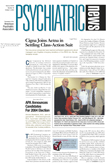Serious mental illness affects 8.3 percent of the nation’s population aged 18 and older, or an estimated 17.5 million people, according to the 2002 National Survey on Drug Use and Health (NSDUH).
Also, in 2002, an estimated 4 million adults met criteria for both serious mental illness and substance dependence or abuse in the preceding year. Of these, an estimated 2.4 million with mental illness were dependent on or abused alcohol, 900,000 were dependent on or abused illicit drugs, and 800,000 were dependent on or abused drugs and alcohol.
“Serious mental illness is highly correlated with substance dependence and abuse,” said Substance Abuse and Mental Health Services Administration (SAMHSA) Administrator Charles Curie at a press conference in Washington D.C., in September to announce the findings.
Among the 17.5 million Americans with mental illness, 28.9 percent used an illicit drug during the previous year, while the rate was just 12.7 percent among those without a psychiatric illness, he told attendees.
The findings, he said, will be used as a guide to the “expansion of the assessment and treatment of people with co-occurring substance abuse and mental health disorders.”
The survey is conducted each year and also gathers data on drug, alcohol, and tobacco use (see
facing page).
In the survey, serious mental illness is defined as experiencing during the past year a diagnosable mental, behavioral, or emotional disorder that meets DSM- IV criteria and results in functional impairment that substantially interferes with or limits one or more major life activities.
Among findings from the survey regarding serious mental illness and treatment:
• Of the 17.5 million people with mental illness, 8.4 million received treatment for a mental health problem in the year prior to the survey.
• Among adults with mental illness, 30 percent perceived themselves as having an unmet need for treatment in the year prior to the survey.
• Those who perceived an unmet need for treatment cited the following reasons for not getting treatment: “could not afford [treatment]” (44.3 percent); “did not know where to go for services” (20.5 percent); “concerned about confidentiality” (13.4 percent); “health insurance does not pay enough for mental health treatment/counseling” (12.8 percent); and “might cause neighbors/community to have negative opinion” (12.3 percent).
• In 2002, an estimated 4.8 million youth aged 12 to 17, about 19.3 percent of that population, received treatment or counseling for emotional or behavioral problems.
• Of the 4.8 million youth who received mental health treatment, the reasons cited most often were “felt depressed” (49.5 percent); “breaking the rules or acting out” (26.7 percent); “thought about killing self or tried to kill self” (19.5 percent); and “felt very afraid or tense” (19.5 percent).
More information about the 2002 National Survey on Drug Use and Health is posted on the Web at www.samhsa.gov/oas/nhsda.htm#NHSDAinfo. ▪
